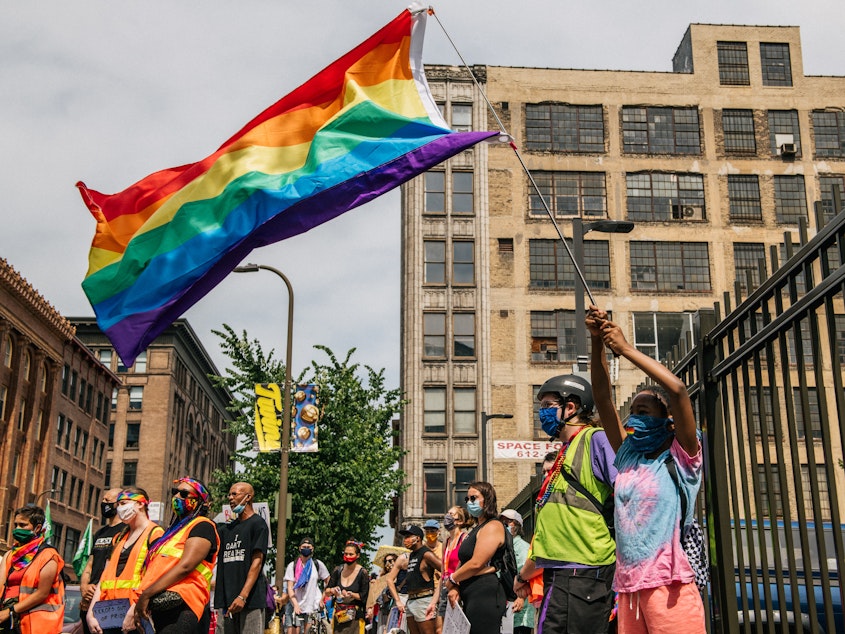New Restrictions In Minnesota Seek To Sharply Curtail Conversion Therapy For Minors

A new Minnesota executive order sets out to protect minors in the state from so-called "conversion therapy," circumventing multiple defeats of statewide proposals in the Minnesota state legislature.
The new order, signed Thursday by Gov. Tim Walz, seeks to limit minors' access to the practice, which aims to convert a person's sexual orientation or gender identity to heterosexual or cisgender. The therapy is widely discredited by medical experts.
"This is a day that Minnesota says, 'Bring your authentic self. You'll be seen, heard, valued and loved in this state, and we want you to be whoever you are,'" Walz, a Democrat, said at the signing ceremony. "We see you, we hear you, and we will make sure you are in a safe place to be who you are. And this law — this EO — will take one more step."
The order is not an outright ban, which can only be accomplished through legislation in Minnesota. Efforts to do so have been blocked in recent years by the Republican majority in the state senate.
Instead, the order directs state agencies to leverage legal authorities — including licensing and insurance reimbursement — in order to "have the effect of barring access" to the practice, according to state senator Scott Dibble, an openly gay state legislator who has long advocated for a ban.
Officials and advocates described the order as merely a "first step" and urged the Minnesota state legislature to renew attention to an official ban.
"I spent years loathing myself, wondering why I was cursed or weak or simple, praying fervently for the strength to change," said Dibble, one of few openly gay state legislators, who paused to collect himself at one point during his comments.
Hundreds of thousands of Americans have undergone "conversion therapy"
Studies estimate that hundreds of thousands of Americans have undergone conversion therapy, many of them while they were minors. Also called reparative therapy, it is typically religious in nature.
The practice is uniformly opposed by the country's major medical organizations, including the American Psychological Association and the American Medical Association, both of which cite studies showing that such treatment can lead to distress, anxiety and suicidal thoughts.
"I was being told that there was something wrong with me, that I was broken, that I didn't deserve to be here. All I ever wanted was to be accepted," said Junior Avalos at Thursday's signing ceremony. As a 16-year-old, he chose to attend conversion therapy and has now become an advocate against the practice.
"It didn't work," Avalos said, describing it as a "trauma."
More than 20 other states and the District of Columbia outright ban the therapy for minors.
Activists in Minnesota have been advocating for a ban for more than a decade. Several cities in Minnesota, including Minneapolis and St. Paul, have banned conversion therapy in recent years.
Republican legislators have repeatedly blocked a statewide ban
Statewide legislation has repeatedly stalled due to opposition from Republicans, who control the state Senate.
Most recently, Democrats in the legislature backed a bill in 2019, co-introduced by Dibble and then-state representative Hunter Cantrell, at the time the only openly gay members of the state House and Senate.
"This is something that we can all get behind and we can all be proud of, because I think we can all agree no therapy should harm our children, no therapy should be deceptive," said Cantrell in 2019, speaking to Minnesota Public Radio.
But the bill died in 2019, then again in 2020, when Republicans said they were concerned with protecting talk therapy and free-speech rights. Others said that because conversion therapy was uncommon in Minnesota, a ban was unnecessary.
The governor's new order could renew pressure on the state legislature to pass a ban.
"That needs to be a law. I mean, that just straight up needs to be a law, a banned practice, no one can receive conversion therapy who doesn't have legal agency and standing on their own. They need protection from the state," Dibble said Thursday. [Copyright 2021 NPR]

